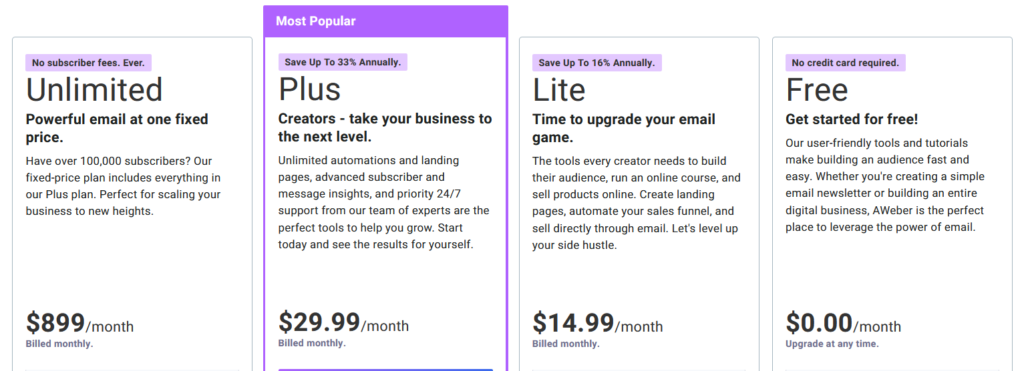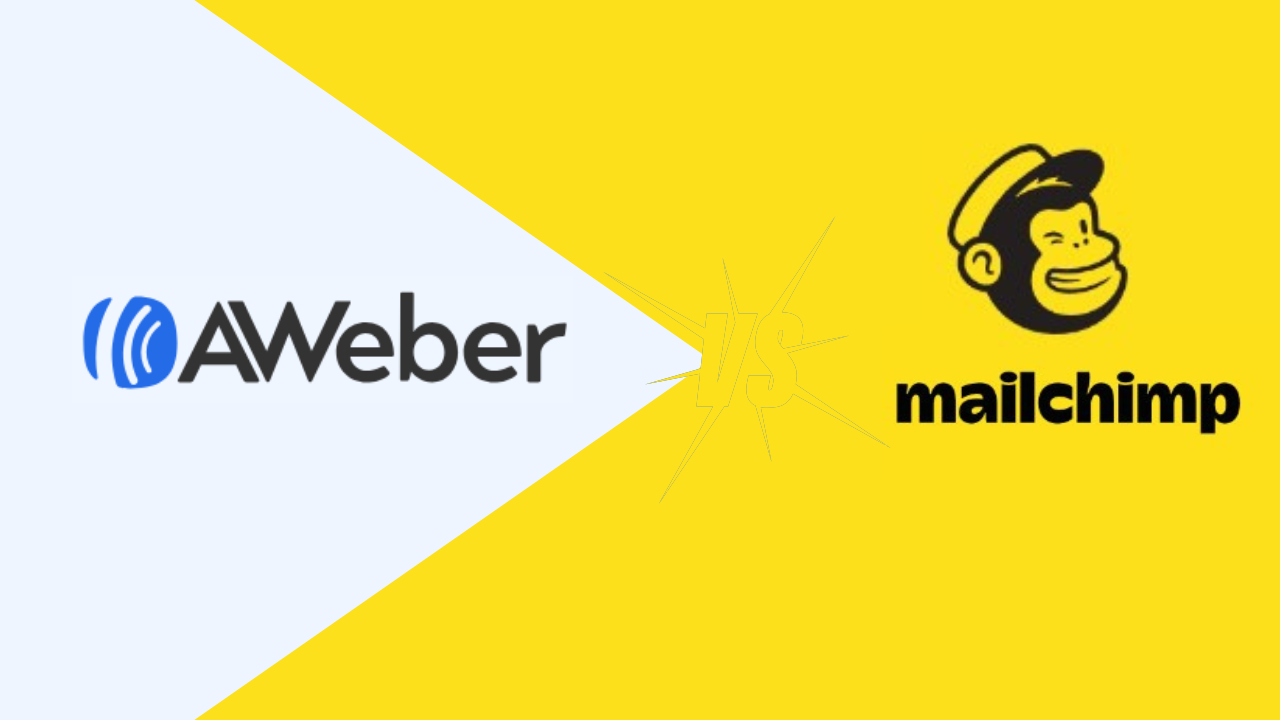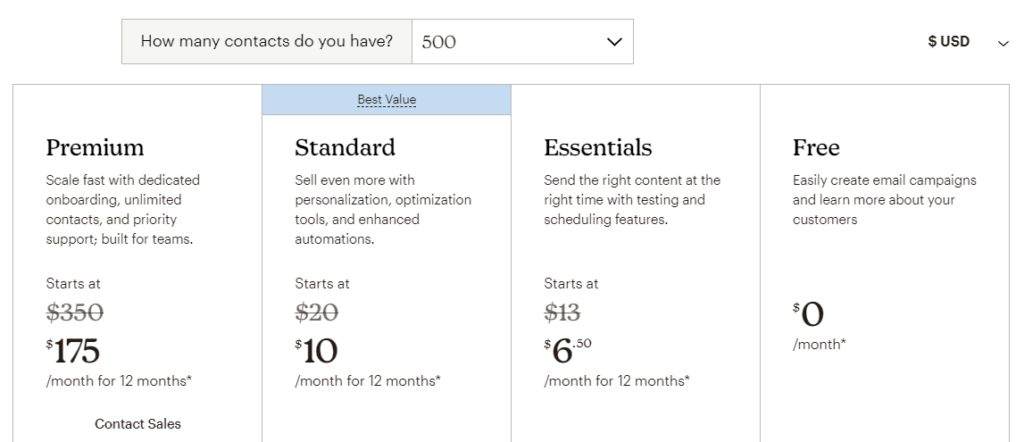Introduction:
Deciding between Mailchimp vs Aweber for your email marketing needs is more than just a choice—it’s about finding the right tool that aligns with your marketing goals and business strategy. This blog post dives deep into the comparison of these two giants, exploring their pricing, ease of use, features, and more, to give you the insights needed to make an informed decision. Whether you’re just starting or looking to switch platforms, understanding the nuances of Mailchimp vs Aweber in 2024 is crucial for maximizing your email marketing effectiveness.
Table of Contents
1. An Overview: Mailchimp vs Aweber – 2024

In the digital age, email marketing remains a cornerstone of business communication and marketing strategies. Choosing the right platform can make a significant difference in reaching your audience effectively. This is where the comparison between Mailchimp and Aweber, two of the leading email marketing services in 2024, becomes crucial. Both platforms offer unique features and benefits, but which one is the best fit for your business needs?
Understanding Mailchimp and Aweber
Mailchimp has been a favorite due to its user-friendly interface and robust feature set, making it an excellent choice for beginners and advanced users alike. It offers a wide range of templates, automation tools, and analytics to optimize your email campaigns.
Aweber, on the other hand, prides itself on high deliverability rates and exceptional customer service. It provides a straightforward approach to email marketing, with easy-to-use tools and a focus on small to medium-sized businesses.
Why This Comparison Matters
The “Mailchimp vs Aweber” debate is more than just choosing a tool; it’s about finding a partner that aligns with your business goals, audience engagement strategies, and budget constraints. This comparison will delve into various aspects, including pricing, ease of use, features, and customer support, to help you make an informed decision.
With the right email marketing platform, you can create engaging campaigns that resonate with your audience and drive results. Whether you’re a startup, a growing business, or an established brand, understanding the nuances of Mailchimp vs Aweber in 2024 is the first step toward maximizing your email marketing efforts. Stay tuned as we explore the critical aspects of these platforms to help you choose the best option for your marketing needs.
2. Ease of Use: Aweber vs Mailchimp – 2024
When selecting an email marketing platform, ease of use is a critical factor, especially for those new to email marketing or with limited technical skills. In 2024, both Mailchimp and Aweber have evolved, but how do they stack up in terms of user-friendliness? Let’s dive into the ease of use for Aweber vs Mailchimp.
Mailchimp’s User Interface
Mailchimp is renowned for its intuitive and user-friendly interface. Its dashboard is designed for ease of navigation, allowing users to quickly find features and tools. Creating email campaigns is straightforward, thanks to its drag-and-drop email builder and a wide selection of customizable templates. This makes it simple for beginners to design professional-looking emails without prior design experience.
Aweber’s Approach to Usability
Aweber counters with a similarly user-friendly experience. It offers a clean interface that makes campaign setup and management accessible to users of all skill levels. Aweber’s strength lies in its simplicity and the direct approach it takes to campaign creation and list management. Its drag-and-drop builder and template selection are also notable, providing a seamless process for crafting emails.
Comparison and Considerations
- Template Editing: Both platforms offer a drag-and-drop editor, but Mailchimp leads slightly in template variety and customization options.
- Learning Curve: Mailchimp and Aweber are both designed with the user in mind, minimizing the learning curve. However, Mailchimp’s extensive features may require a bit more exploration for complete mastery.
- Automation Workflow: For users looking to set up complex automation workflows, Mailchimp offers a more visually intuitive automation builder compared to Aweber’s more linear approach.
Both Mailchimp and Aweber prioritize making email marketing accessible and straightforward, offering platforms that balance robust features with user-friendly designs. While Mailchimp offers a slightly more sophisticated range of features and templates, Aweber maintains a focus on simplicity and efficiency. Your choice might come down to personal preference for interface design or the specific needs of your email marketing campaigns.
3. Features: Mailchimp vs Aweber – 2024
When comparing Mailchimp and Aweber, the range and quality of features are pivotal in deciding the right email marketing tool for your business. In 2024, both platforms have enhanced their offerings, but let’s break down how their features stack up against each other.
Email Campaigns and Automation
Mailchimp shines with its advanced automation features, allowing for sophisticated targeted campaigns based on user behavior, preferences, and previous interactions. It offers comprehensive options for autoresponders, customer journey mapping, and behavioral targeting, making it a powerhouse for marketers looking to automate complex email sequences.
Aweber, while more straightforward, provides robust autoresponder functionalities that are easy to set up and manage. Its automation capabilities have improved, focusing on simplicity and effectiveness for small to medium-sized businesses. Aweber ensures that users can effectively automate their email communication without the need for intricate setups.
Templates and Design
Both platforms boast a vast library of email templates, but Mailchimp takes the lead in design variety and customization options. Its drag-and-drop editor is highly intuitive, offering greater flexibility for creative designs. Mailchimp’s templates are responsive and cater to a wide range of industries and purposes.
Aweber counters with a solid selection of templates and a user-friendly editor. Its focus is on efficiency and accessibility, ensuring that even those with minimal design experience can create appealing emails. Aweber’s templates are also responsive, ensuring that emails look great on any device.
List Management and Segmentation
Aweber excels in list management and segmentation, providing straightforward tools for organizing subscribers based on various criteria. This makes sending targeted emails simpler and more effective, enhancing engagement and conversion rates.
Mailchimp offers advanced segmentation features, including predictive segmentation based on subscriber behavior. This allows for highly personalized email campaigns, although the setup can be more complex than Aweber’s straightforward approach.
Integrations and Reporting
Both Mailchimp and Aweber offer extensive integrations with various eCommerce platforms, CRM systems, and social media tools, allowing for seamless synchronization of data and workflows.
In terms of analytics and reporting, Mailchimp provides detailed reports with visual insights into campaign performance, subscriber activity, and more. Aweber offers comprehensive reporting features as well, with a focus on delivering actionable insights to improve future campaigns.
Choosing between Mailchimp and Aweber in 2024 comes down to the specific features your business values most in an email marketing platform. If you’re looking for advanced automation capabilities and a wide array of creative design options, Mailchimp might be the way to go. However, if simplicity, effective list management, and straightforward automation are your priorities, Aweber could better suit your needs.
4. Integration: Mailchimp vs Aweber – 2024
In today’s digital ecosystem, the ability of an email marketing tool to integrate with other platforms and services is critical. A seamless integration can streamline workflows, enhance functionality, and ultimately lead to more effective marketing strategies. Let’s compare how Mailchimp and Aweber stand in terms of integration capabilities in 2024.
Mailchimp’s Integration Ecosystem
Mailchimp has long been recognized for its extensive integration capabilities. As of 2024, it connects effortlessly with a wide array of platforms, including e-commerce giants like Shopify and WooCommerce, CRM systems such as Salesforce, and various social media platforms. This extensive ecosystem enables businesses to automate the syncing of customer data, streamline their marketing efforts across multiple channels, and leverage powerful analytics to refine their strategies.
Aweber’s Integration Offerings
Aweber focuses on providing a robust set of integration options tailored to small and medium-sized businesses. Its integration list includes popular e-commerce platforms, WordPress, and several CRM systems, ensuring that businesses can maintain a cohesive flow of data across their tools. Aweber’s integrations are designed to be straightforward, making it easy for users to connect their email marketing efforts with other critical business processes.
Key Differences and Considerations
- E-commerce Integration: Mailchimp offers advanced features for e-commerce integration, such as product recommendations and purchase behavior tracking, which are particularly beneficial for online stores.
- Ease of Integration: Both platforms offer easy-to-use integration options, but Aweber’s process is slightly more accessible for users without a technical background.
- Third-Party Apps: Mailchimp boasts a larger selection of third-party app integrations, providing more flexibility in customizing your email marketing toolkit.
Where to Add Images
The choice between Mailchimp and Aweber for integration capabilities depends on your specific needs and the tools you already use or plan to use. Mailchimp offers a broader range of integrations and more advanced features, making it a better fit for businesses looking to leverage a wide array of platforms and services. Aweber, however, provides a solid, user-friendly selection that covers the essentials for effective email marketing integration, particularly suited to small and medium-sized businesses.
5. Deliverability Rates: Aweber vs Mailchimp – 2024
Email deliverability rates are a critical metric for any email marketing campaign. They measure the percentage of your emails that reach your subscribers’ inboxes, not getting caught in spam filters or rejected by email servers. In 2024, both Mailchimp and Aweber have worked diligently to optimize their services for high deliverability rates, but how do they compare?
What Affects Deliverability?
Before diving into the specifics of each service, it’s important to understand what factors contribute to high deliverability rates. These include the sender’s reputation, email content quality, engagement rates from recipients, and compliance with email-sending best practices. Both Mailchimp and Aweber provide tools and guidance to help users optimize these factors.
Mailchimp’s Deliverability Rates
Mailchimp has consistently focused on maintaining high deliverability rates for its users. It offers comprehensive analytics tools that allow marketers to track the performance of their email campaigns, including open rates, click rates, and bounce rates. Mailchimp also provides a robust set of best practices guides and resources to help users craft emails that are more likely to be delivered successfully. Additionally, it actively manages its sending infrastructure to maintain a strong sender reputation.
Aweber’s Deliverability Rates
Aweber prides itself on its deliverability rates, often citing them as one of the key advantages of their platform. Like Mailchimp, Aweber offers detailed reporting on email campaign performance. It also provides educational content aimed at helping users improve their email strategies. Aweber’s commitment to deliverability is evident in its proactive monitoring of sending practices and its aggressive stance on combating spam, which helps protect its sender reputation.
Key Considerations
- Authentication and Compliance: Both platforms emphasize the importance of authentication protocols like SPF, DKIM, and DMARC, and comply with anti-spam laws, which are crucial for deliverability.
- Content Optimization: Mailchimp and Aweber offer tools for testing and optimizing email content, which can significantly impact whether an email is delivered to the inbox or relegated to the spam folder.
- List Management: Clean, well-managed subscriber lists are vital for deliverability. Both services provide features to help manage your lists effectively, but Aweber places a particularly strong emphasis on list hygiene practices.
Both Mailchimp and Aweber offer robust solutions to ensure high email deliverability rates, but the choice between them may come down to the specifics of your email marketing strategy and the level of support and resources you require. With their focus on sender reputation, compliance, and email optimization, both platforms equip users with the tools they need to maximize the reach of their email campaigns. Ultimately, consistently following best practices for email marketing and actively using the tools and resources provided by your chosen platform are key to achieving and maintaining high deliverability rates.
6. Pricing and Plans: Mailchimp vs Aweber – 2024
When choosing an email marketing service, understanding the pricing and plans is crucial to finding the best fit for your budget and needs. Let’s compare Mailchimp and Aweber in 2024 to see which offers the most value for your investment. Both Mailchimp and AWeber offer free and paid plans, but understanding the pricing structure of each can help you decide which platform offers the best value for your money.
Free Plans:
- Mailchimp: Mailchimp’s free plan allows you to build an audience of up to 500 subscribers and send 2,500 emails per month. This is a good option for those just starting with email marketing or with a very small audience. It includes basic features like email templates, a drag-and-drop editor, and signup forms. However, important features like marketing automation, A/B testing, and advanced analytics are locked behind their paid plans.
- AWeber: AWeber’s free plan is similar, allowing up to 500 subscribers but with a slightly higher limit of 3,000 emails per month. This plan also includes basic features like email templates, a drag-and-drop editor, and landing page creation. However, similar to Mailchimp’s free plan, features like advanced segmentation, split testing, and abandoned cart automation are unavailable on the free tier.
Paid Plans:
Both Mailchimp and AWeber offer multiple paid plans with increasing features and subscriber limits. Here’s a breakdown of their starting points in April 2024:
- Mailchimp: Their paid plans start at $13 per month for up to 500 subscribers (Essentials plan). However, this plan comes with limitations on features like automation and A/B testing. To unlock these features, you’ll need to upgrade to their Standard plan which starts at $20 per month for the same 500 subscriber limit. Furthermore, it provides Premium Plan starting at $350 for up to 500 subscribers, however for more features such as Phone & Priority Support
- AWeber: AWeber’s basic paid plan starts at $14.99 per month for up to 500 subscribers (Lite plan). This plan offers more features than Mailchimp’s basic offering, including landing page creation and basic automation capabilities. Other paid plan provided by AWeber includes Plus at $20.0 with features such as Unlimited automation and landing pages, advanced subscriber and message insights, and priority 24/7 support. Also, AWeber provides an Unlimited plan starting at $889 per month, which is Perfect for scaling the business to new heights, this plan includes all features from the Plus plan plus no subscriber feed and more than 100,000 subscribers.

Both Mailchimp and Aweber offer compelling options in 2024, with plans designed to suit various needs and budgets. While Mailchimp presents more tiered options suitable for scaling businesses, Aweber offers simplicity and value, especially for those just starting. Your choice between Mailchimp and Aweber should consider your current needs, future growth, and the specific features that matter most to your marketing strategy
7. Customer Support: Mailchimp vs Aweber – 2024
In the realm of email marketing, having access to responsive and knowledgeable customer support can make a significant difference, especially when you encounter issues or have questions about your campaigns. Both Mailchimp and Aweber recognize this need and offer various support channels in 2024. Let’s evaluate the customer support services provided by Mailchimp vs Aweber, highlighting how they can help you navigate any challenges you might face.
Mailchimp’s Customer Support
Mailchimp offers a comprehensive range of customer support options, including:
- Email Support: Available to all users, offering detailed, personalized responses to queries.
- Live Chat: Accessible to paid account holders, providing real-time assistance for immediate issues.
- Knowledge Base: An extensive collection of articles, guides, and tutorials available to everyone. This self-service resource is designed to help users find quick solutions to common problems.
- Community Forum: A platform where users can share advice, tips, and solutions based on their experiences.
While Mailchimp’s direct support (email and live chat) is restricted to users on paid plans, the knowledge base and community forum are valuable resources for all users.
Aweber’s Customer Support
Aweber prides itself on its award-winning customer service, which includes:
- 24/7 Email and Live Chat Support: Unlike Mailchimp, Aweber offers round-the-clock email and live chat support to both free and paid users.
- Phone Support: A rare offering not provided by many competitors, including Mailchimp, available during business hours for more personalized assistance.
- Knowledge Base: A comprehensive library of articles, videos, and tutorials designed to help users troubleshoot issues and learn best practices.
- Webinars: Regularly scheduled educational webinars that cover various aspects of email marketing, from basics to advanced strategies.
Aweber’s commitment to accessible and varied support channels is a significant advantage, especially for businesses that value immediate and diverse forms of assistance.
Key Considerations
- Accessibility: Aweber provides more accessible support across all plan levels, including 24/7 options and phone support, which can be crucial for businesses requiring immediate help.
- Resources: Both platforms offer extensive knowledge bases and educational resources, making it easy for users to learn at their own pace.
- Community Engagement: Mailchimp’s community forum offers a unique space for peer-to-peer support, which can be invaluable for creative problem-solving and networking.
Both Mailchimp and Aweber offer robust customer support systems designed to assist users with a wide range of issues and questions. The choice between them may hinge on the level of support your business needs. Aweber stands out for its accessibility to all users, including 24/7 support and the unique offering of phone assistance, making it an excellent choice for businesses that prioritize immediate and varied support channels. Mailchimp, with its structured support based on subscription tiers, still provides substantial resources and assistance, particularly beneficial for users who prefer self-service options and peer support through community forums.
8. Analytics and Reporting: Mailchimp vs Aweber – 2024
In email marketing, the ability to analyze campaign performance through detailed analytics and reporting is crucial for optimizing strategies and improving outcomes. Both Mailchimp and Aweber offer comprehensive analytics and reporting features in 2024, but there are differences in their approaches and capabilities. Let’s explore how these platforms compare in terms of helping users understand their campaign performance.
Mailchimp’s Analytics Features
Mailchimp offers a robust analytics dashboard that provides insights into a wide range of metrics, including open rates, click-through rates, subscriber growth, and campaign performance over time. Key features include:
- Advanced Reporting: Access detailed reports on individual campaigns or track performance trends over time.
- Audience Insights: Gain a deeper understanding of your audience with demographic information, behavior tracking, and segmentation performance.
- Comparative Reports: Compare the performance of different campaigns side-by-side to identify what works best.
- E-commerce Tracking: For businesses using Mailchimp’s e-commerce features, track sales and revenue directly attributed to your email campaigns.
Mailchimp’s analytics are designed to offer actionable insights, helping users refine their strategies for better engagement and conversions.
Aweber’s Reporting Capabilities
Aweber provides a comprehensive set of reporting tools focused on ease of use and clarity. Users can access a wide range of data points to evaluate their email marketing efforts, including:
- Engagement Reports: View open rates, click-through rates, and engagement over time.
- Subscriber Growth: Track how your list is growing and where your new subscribers are coming from.
- Sales Tracking: Connect your emails to sales data to see the direct impact of your campaigns.
- A/B Testing Results: Easily compare different versions of your emails to see which performs better.
Aweber’s reports are user-friendly, making it straightforward for businesses of all sizes to understand their email marketing performance.
Key Considerations
- Depth of Analysis: Mailchimp offers more in-depth analytics and advanced features like audience insights and comparative reports, which may appeal to users looking for granular data.
- Ease of Understanding: Aweber’s reporting is designed to be easily digestible, making it a good choice for those who prefer straightforward, actionable insights without the need for deep data analysis.
- Integration with E-commerce: Both platforms provide e-commerce tracking, but Mailchimp’s integration is more extensive, offering detailed insights into customer behavior and purchase patterns.
Mailchimp and Aweber both offer powerful analytics and reporting tools that cater to the needs of modern email marketers. The choice between them depends on the level of detail and analysis you require from your reporting tools. Mailchimp’s advanced analytics might be more suitable for businesses that need deep insights and the ability to compare and contrast various data points. Aweber, with its focus on clarity and ease of use, is ideal for users who value straightforward reporting that quickly informs strategy adjustments. Both platforms provide valuable insights into campaign performance, subscriber behavior, and e-commerce activity, helping users to continually refine their email marketing efforts for maximum impact.
9. Compliance and Security: Mailchimp vs Aweber – 2024
In the world of email marketing, compliance with regulatory requirements and the security of data are paramount. Violations can lead to severe penalties, not to mention damage to your brand’s reputation. Both Mailchimp and Aweber understand this importance and have implemented robust systems to ensure their users are both compliant and secure. Let’s examine how Mailchimp and Aweber stack up in 2024 regarding compliance and security measures.
Data Protection and Privacy
Mailchimp adheres to global privacy laws like the General Data Protection Regulation (GDPR) and the California Consumer Privacy Act (CCPA), ensuring users can manage and protect their subscribers’ data effectively. Mailchimp provides features like consent checkboxes and customizable privacy policies that help users stay compliant with these regulations.
Aweber also takes data protection seriously, offering similar compliance tools to help users navigate the complexities of GDPR and other privacy laws. Aweber’s commitment to privacy is evident in its easy-to-use list management features, allowing users to maintain up-to-date and compliant subscriber lists.
Security Measures
Mailchimp employs several security measures to protect user data, including two-factor authentication (2FA), data encryption in transit and at rest, and regular security audits. These measures ensure that sensitive information remains secure from unauthorized access.
Aweber matches these security protocols, offering 2FA, SSL/TLS encryption, and rigorous compliance with international security standards. Aweber’s proactive security stance ensures users’ data, and their subscribers’ information, is protected against evolving cyber threats.
Anti-Spam Policies
Both platforms have strict anti-spam policies to ensure their services are not used for spamming purposes, which is essential for maintaining high deliverability rates and compliance with email marketing laws.
- Mailchimp uses sophisticated algorithms to monitor outgoing emails for spam-like characteristics and provides users with guidelines to avoid spam filters.
- Aweber focuses on education and preventive measures, offering resources to help users understand how to create valuable, consent-based email content that respects subscribers’ preferences and avoids being marked as spam.
Key Considerations
- User Responsibility: While both Mailchimp and Aweber provide tools and policies for compliance and security, it’s crucial for users to actively use these features and adhere to best practices.
- Transparency: Both services are transparent about their data handling practices, providing detailed information on how user and subscriber data is collected, used, and protected.
Both Mailchimp and Aweber offer robust compliance and security features to ensure that users’ email marketing activities are both effective and lawful. The choice between them will depend on your specific needs and preferences for privacy, data protection, and security measures. By leveraging the compliance tools and adhering to the security practices recommended by these platforms, businesses can protect themselves and their subscribers while delivering impactful email marketing campaigns.
10. User Reviews and Testimonials: Aweber va Mailchimp – 2024
In the decision-making process for choosing the right email marketing service, user reviews and testimonials play a crucial role. They offer insights from actual users about their experiences, highlighting the strengths and potential drawbacks of each platform. Let’s delve into what users are saying about Mailchimp and Aweber in 2024, providing a snapshot of public opinion and firsthand experiences.
Mailchimp User Reviews
Mailchimp is often praised for its user-friendly interface and comprehensive range of features. Users appreciate the flexibility it offers, from its extensive template library to its advanced automation and segmentation capabilities. Small businesses and startups find Mailchimp’s free plan particularly attractive, as it allows them to leverage email marketing tools without a significant initial investment.
However, some users mention that navigating Mailchimp’s pricing structure can be challenging as their needs grow, with certain advanced features locked behind higher-tier plans. Additionally, a few reviews indicate a learning curve in mastering the full suite of tools available.
Aweber User Reviews
Aweber consistently receives high marks for its customer service, with users highlighting the accessibility and helpfulness of its support team. The platform is commended for its ease of use, making it straightforward for users to create, send, and analyze their email campaigns. Aweber’s commitment to deliverability and its straightforward pricing model are also frequently mentioned advantages.
On the flip side, some users wish for a broader selection of templates and more advanced features in Aweber’s toolkit. While Aweber excels in simplicity and support, businesses looking for intricate customization options may find it limiting.
Testimonials and Case Studies
Both Mailchimp and Aweber showcase testimonials and case studies on their websites, offering detailed accounts of how different businesses have successfully used their platforms to achieve their marketing goals. These stories provide valuable context for potential users, illustrating real-world applications and outcomes.
Key Takeaways from Reviews
- Customer Support: Aweber’s customer support is a standout feature, often cited as a key factor in users’ satisfaction.
- Ease of Use: Both platforms are designed with user-friendliness in mind, though Aweber is frequently noted for its simplicity, making it a favorite for those new to email marketing.
- Feature Set: Mailchimp is preferred by users looking for a wide array of features and customization options, despite a steeper learning curve and more complex pricing tiers.
User reviews and testimonials for Mailchimp and Aweber in 2024 reveal that both platforms have their strengths and areas for improvement, as perceived by their user bases. Mailchimp is favored for its comprehensive feature set and scalability, suitable for businesses looking to grow their email marketing efforts. Aweber, with its exceptional customer support and user-friendly approach, is ideal for those prioritizing ease of use and straightforward pricing. Evaluating these insights alongside your specific needs and preferences will guide you in choosing the best email marketing service for your business.
11. Pros and Cons
Choosing between Mailchimp and Aweber for your email marketing needs involves weighing the advantages and disadvantages of each platform. To help make this decision easier, we’ve compiled a concise list of the pros and cons for both Mailchimp and Aweber as of 2024. This comparison aims to provide a clear overview of what each service offers and where they might fall short, depending on your specific requirements.
Mailchimp Pros
- Extensive Feature Set: Offers a wide range of tools for email campaigns, automation, segmentation, and analytics.
- User-Friendly Interface: Designed with an intuitive dashboard and drag-and-drop editor, making it accessible for users of all skill levels.
- Free Plan Available: Provides a robust free plan for up to 2,000 contacts, ideal for small businesses and startups.
- Advanced Automation: Advanced options for customer journeys and behavioral targeting help personalize campaigns.
- E-commerce Integration: Strong integration capabilities with e-commerce platforms, enhancing marketing efforts for online stores.
Mailchimp Cons
- Pricing Structure: As your list grows, the cost can escalate quickly, especially for businesses with a large number of contacts.
- Complexity: Some users may find the extensive features overwhelming or face a steep learning curve to utilize the platform fully.
Aweber Pros
- Exceptional Customer Support: Offers 24/7 access to customer support via email, live chat, and phone, noted for its quality and responsiveness.
- Ease of Use: The platform is straightforward, making it easy for beginners to start their email marketing efforts.
- Deliverability Rates: High deliverability rates ensure that your emails reach your subscribers’ inboxes.
- All-Inclusive Pricing: Pricing is based on the number of subscribers, with all features available across plans, making it simple and predictable.
Aweber Cons
- Limited Templates and Design Flexibility: Compared to Mailchimp, Aweber offers fewer templates and less flexibility in customization.
- Fewer Advanced Features: Lacks some of the more sophisticated automation and segmentation capabilities available with Mailchimp.
Both Mailchimp and Aweber offer compelling features for businesses embarking on email marketing campaigns. Mailchimp stands out for its comprehensive feature set and flexibility, suitable for businesses looking for growth and scalability. Aweber, with its focus on ease of use and exceptional customer support, is an excellent choice for those who prioritize simplicity and reliability. By understanding the pros and cons of Mailchimp vs Aweber, businesses can make an informed decision that best suits their email marketing strategy and objectives.
12. Conclusion and Recommendation: Mailchimp vs Aweber – 2024
After evaluating Mailchimp and Aweber across various categories, including pricing and plans, ease of use, features, integration, deliverability rates, customer support, analytics and reporting, compliance and security, user reviews and testimonials, and the pros and cons, it’s clear that both platforms offer valuable tools for email marketing. The choice between Mailchimp and Aweber ultimately depends on your specific needs, goals, and the scale of your email marketing campaigns.
When to Choose Mailchimp
- For Growing Businesses and E-commerce: If your strategy involves a wide range of marketing activities and requires advanced features like detailed segmentation, complex automation, and comprehensive analytics, Mailchimp is the better choice. Its extensive integration capabilities make it particularly suitable for e-commerce businesses looking to leverage customer data across multiple platforms.
- For Creativity and Customization: If you value creative control over your campaigns with a vast array of templates and design options, Mailchimp’s sophisticated design tools will serve your needs well.
When to Choose Aweber
- For Simplicity and Ease of Use: If you’re new to email marketing or prefer a straightforward, user-friendly platform, Aweber stands out. Its ease of use and excellent customer support make it a solid choice for small businesses and individuals who prioritize simplicity and effectiveness.
- For Reliability and Support: Aweber’s reputation for high deliverability rates and round-the-clock customer support makes it ideal for businesses that need dependable email marketing solutions and immediate support.
General Recommendation
For businesses at the crossroads of choosing between Mailchimp and Aweber in 2024, consider your long-term marketing goals, the complexity of the email campaigns you intend to run, and the level of support you might need. Both platforms have evolved to meet specific market needs, making them leaders in the email marketing domain.
- Start Small and Scale: If you’re unsure, start with the platform that best meets your immediate needs. Remember, as your business grows, your email marketing needs might evolve, and switching platforms is always an option.
- Take Advantage of Free Trials: Utilize free plans or trials offered by both platforms to get a hands-on feel for their features and usability. This direct experience can be invaluable in making a final decision.
In conclusion, both Mailchimp and Aweber offer compelling benefits for businesses looking to leverage email marketing in 2024. By carefully considering your business’s unique needs and preferences, you can choose the platform that will best support your marketing strategies, help you connect with your audience, and drive your business forward.
If you found this comparison of Mailchimp vs AWeber insightful, explore more on our website where we dissect and compare other leading marketing tools. Discover the perfect fit for your business needs by diving into our detailed reviews and comparisons.




